Emperor's Cup
| Mitsubishi Motors | 3–1 | Yanmar Diesel |
|---|---|---|
| ? ? ? | ? |
| 1971 season | |
|---|---|
Japanese football in 1971
| Pos | Team | Pld | W | D | L | GF | GA | GD | Pts | Qualification |
|---|---|---|---|---|---|---|---|---|---|---|
| 1 | Yanmar Diesel | 14 | 9 | 4 | 1 | 32 | 13 | +19 | 22 | Champions |
| 2 | Mitsubishi Motors | 14 | 7 | 4 | 3 | 32 | 12 | +20 | 18 | |
| 3 | Nippon Steel | 14 | 8 | 2 | 4 | 34 | 23 | +11 | 18 | |
| 4 | Hitachi | 14 | 7 | 4 | 3 | 18 | 17 | +1 | 18 | |
| 5 | Furukawa Electric | 14 | 5 | 5 | 4 | 24 | 24 | 0 | 15 | |
| 6 | Toyo Industries | 14 | 3 | 4 | 7 | 11 | 17 | −6 | 10 | |
| 7 | Nippon Kokan | 14 | 2 | 4 | 8 | 11 | 23 | −12 | 8 | To Promotion/Relegation Series |
| 8 | Nagoya Mutual Bank | 14 | 0 | 3 | 11 | 10 | 43 | −33 | 3 |
| Mitsubishi Motors | 3–1 | Yanmar Diesel |
|---|---|---|
| ? ? ? | ? |
| 1971.09.23 | Japan | 0–3 | Malaysia | Seoul, South Korea |
| JFA | ? ? ? | Attendance: 15,000 |
| 1971.09.27 | Japan | 8–1 | Philippines | Seoul, South Korea |
| Ogi Kamamoto Tomizawa Yoshimura | JFA | ? | Attendance: 8,000 |
| 1971.09.29 | Japan | 5–1 | Chinese Taipei | Seoul, South Korea |
| Kamamoto Yoshimura T. Miyamoto | JFA | ? | Attendance: 5,000 |
| 1971.10.02 | Japan | 1–2 | South Korea | Seoul, South Korea |
| Nagai | JFA | ? ? | Attendance: 30,000 |
| Player | -1970 | 07.28 | 08.13 | 09.23 | 09.27 | 09.29 | 10.02 | 1971 | Total |
| Teruki Miyamoto | 52(18) | O | O | O | O | O(1) | O | 6(1) | 58(19) |
| Ryuichi Sugiyama | 50(13) | O | O(2) | O | O | O | O | 6(2) | 56(15) |
| Masakatsu Miyamoto | 40(1) | - | - | O | O | O | O | 4(0) | 44(1) |
| Aritatsu Ogi | 36(7) | O | O | - | O(2) | O | O | 5(2) | 41(9) |
| Yoshitada Yamaguchi | 35(0) | O | O | O | O | O | O | 6(0) | 41(0) |
| Kenzo Yokoyama | 34(0) | O | O | O | O | O | O | 6(0) | 40(0) |
| Hiroshi Katayama | 33(0) | O | - | O | O | O | O | 5(0) | 38(0) |
| Takaji Mori | 30(1) | O | O | - | - | - | O | 3(0) | 33(1) |
| Kunishige Kamamoto | 27(31) | O(2) | O | O | O(3) | O(3) | O | 6(8) | 33(39) |
| Yoshio Kikugawa | 14(0) | O | O | - | - | - | - | 2(0) | 16(0) |
| Tadahiko Ueda | 10(7) | O | O | O | - | - | - | 3(0) | 13(7) |
| Kozo Arai | 6(0) | - | - | O | O | O | O | 4(0) | 10(0) |
| Kiyoshi Tomizawa | 6(0) | - | - | O | O(2) | - | O | 3(2) | 9(2) |
| Nelson Yoshimura | 4(1) | O | O | O | O(1) | O(1) | O | 6(2) | 10(3) |
| Nobuo Kawakami | 4(0) | O | - | - | - | - | - | 1(0) | 5(0) |
| Takeshi Ono | 1(0) | O | O | - | - | - | - | 2(0) | 3(0) |
| Yoshikazu Nagai | 0(0) | - | O | - | O | O | O(1) | 4(1) | 4(1) |
| Seiichi Sakiya | 0(0) | - | - | - | O | O | - | 2(0) | 2(0) |
| Atsuyoshi Furuta | 0(0) | - | O | - | - | - | - | 1(0) | 1(0) |
| Michio Ashikaga | 0(0) | - | - | O | - | - | - | 1(0) | 1(0) |
| Nobuo Fujishima | 0(0) | - | - | - | - | O | - | 1(0) | 1(0) |
Anime is hand-drawn and computer-generated animation originating from Japan. Outside of Japan and in English, anime refers specifically to animation produced in Japan. However, in Japan and in Japanese, anime describes all animated works, regardless of style or origin. Animation produced outside of Japan with similar style to Japanese animation is commonly referred to as anime-influenced animation.

EmperorShōwa, commonly known in English-speaking countries by his personal name Hirohito (裕仁), was the 124th emperor of Japan, ruling from 25 December 1926 until his death in 1989. Hirohito and his wife, Empress Kōjun, had two sons and five daughters; he was succeeded by his fifth child and eldest son, Akihito. By 1979, Hirohito was the only monarch in the world with the title "emperor". He was the longest-reigning historical Japanese emperor and one of the longest-reigning monarchs in the world.

Japan is an island country in East Asia. It is situated in the northwest Pacific Ocean, and is bordered on the west by the Sea of Japan, while extending from the Sea of Okhotsk in the north toward the East China Sea, Philippine Sea, and Taiwan in the south. Japan is a part of the Ring of Fire, and spans an archipelago of 6852 islands covering 377,975 square kilometers (145,937 sq mi); the five main islands are Hokkaido, Honshu, Shikoku, Kyushu, and Okinawa. Tokyo is the nation's capital and largest city, followed by Yokohama, Osaka, Nagoya, Sapporo, Fukuoka, Kobe, and Kyoto.
Japanese is spoken natively by about 128 million people, primarily by Japanese people and primarily in Japan, the only country where it is the national language. Japanese belongs to the Japonic or Japanese-Ryukyuan language family. There have been many attempts to group the Japonic languages with other families such as the Ainu, Austroasiatic, Koreanic, and the now-discredited Altaic, but none of these proposals has gained widespread acceptance.

Manga are comics or graphic novels originating from Japan. Most manga conform to a style developed in Japan in the late 19th century, and the form has a long prehistory in earlier Japanese art. The term manga is used in Japan to refer to both comics and cartooning. Outside of Japan, the word is typically used to refer to comics originally published in the country.

Tokyo, officially the Tokyo Metropolis, is the capital and largest city of Japan. Formerly known as Edo, its metropolitan area is the most populous in the world, with an estimated 37.468 million residents as of 2018; the city proper has a population of 13.99 million people. Located at the head of Tokyo Bay, the prefecture forms part of the Kantō region on the central coast of Honshu, Japan's largest island. Tokyo serves as Japan's economic center and is the seat of both the Japanese government and the Emperor of Japan.

World War II or the Second World War, often abbreviated as WWII or WW2, was a world war that lasted from 1939 to 1945. It involved the vast majority of the world's countries—including all of the great powers—forming two opposing military alliances: the Allies and the Axis powers. World War II was a total war that directly involved more than 100 million personnel from more than 30 countries.
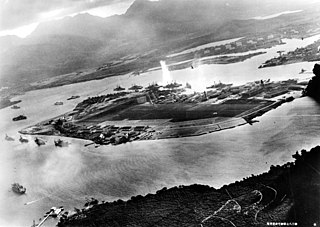
The attack on Pearl Harbor was a surprise military strike by the Imperial Japanese Navy Air Service upon the United States against the naval base at Pearl Harbor in Honolulu, Territory of Hawaii, just before 8:00 a.m. on Sunday, December 7, 1941. The United States was a neutral country at the time; the attack led to its formal entry into World War II the next day. The Japanese military leadership referred to the attack as the Hawaii Operation and Operation AI, and as Operation Z during its planning.
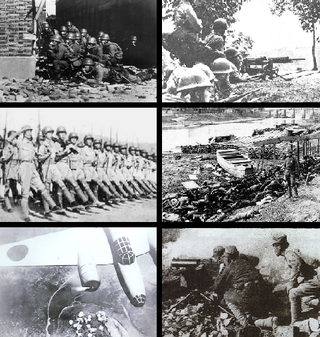
The Second Sino-Japanese War (1937–1945) or War of Resistance was a military conflict that was primarily waged between the Republic of China and the Empire of Japan. The war made up the Chinese theater of the wider Pacific Theater of the Second World War. The beginning of the war is conventionally dated to the Marco Polo Bridge Incident on 7 July 1937, when a dispute between Japanese and Chinese troops in Peking escalated into a full-scale invasion. Some Chinese historians believe that the Japanese invasion of Manchuria on 18 September 1931 marks the start of the war. This full-scale war between the Chinese and the Empire of Japan is often regarded as the beginning of World War II in Asia.

The Empire of Japan, also known as the Japanese Empire or Imperial Japan, was a historical nation-state and great power that existed from the Meiji Restoration in 1868 until the enactment of the post-World War II 1947 constitution and subsequent formation of modern Japan. It encompassed the Japanese archipelago and several colonies, protectorates, mandates, and other territories.
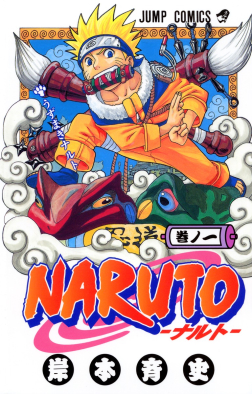
Naruto is a Japanese manga series written and illustrated by Masashi Kishimoto. It tells the story of Naruto Uzumaki, a young ninja who seeks recognition from his peers and dreams of becoming the Hokage, the leader of his village. The story is told in two parts – the first set in Naruto's pre-teen years, and the second in his teens. The series is based on two one-shot manga by Kishimoto: Karakuri (1995), which earned Kishimoto an honorable mention in Shueisha's monthly Hop Step Award the following year, and Naruto (1997).
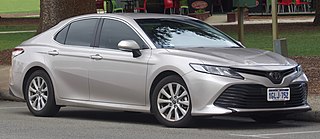
The Toyota Camry is an automobile sold internationally by the Japanese auto manufacturer Toyota since 1982, spanning multiple generations. Originally compact in size (narrow-body), the Camry has grown since the 1990s to fit the mid-size classification (wide-body)—although the two widths co-existed in that decade. Since the release of the wide-bodied versions, Camry has been extolled by Toyota as the firm's second "world car" after the Corolla. As of 2022, the Camry is positioned above the Corolla and below the Avalon or Crown in several markets.

The Japan national football team, nicknamed the Samurai Blue, represents Japan in men's international football. It is controlled by the Japan Football Association (JFA), the governing body for football in Japan.

The Senegal national football team, nicknamed the Lions of Teranga, represents Senegal in international association football and is operated by the Senegalese Football Federation.

The South Korea national football team represents South Korea in men's international football and is governed by the Korea Football Association. South Korea has emerged as a major football power in Asia since the 1980s, having participated in ten consecutive and eleven overall FIFA World Cup tournaments, the most for any Asian country. Despite initially going through five World Cup tournaments without winning a match, South Korea became the first Asian team to reach the semi-finals when they co-hosted the 2002 tournament with Japan. South Korea also won two AFC Asian Cup titles, and finished as runners-up on four occasions. Furthermore, the team won three gold medals and three silver medals at the senior Asian Games.

The Saudi Arabia national football team represent Saudi Arabia in men's international football. They are known as Al-Suqour Al-Khodhur in reference to their traditional colours of green and white and represent both FIFA and the Asian Football Confederation (AFC).

The Japan women's national football team, or nicknamed Nadeshiko Japan (なでしこジャパン), represents Japan in women's association football and is run by the Japan Football Association (JFA). It is the most successful women's national team from the Asian Football Confederation. Its highest ranking in the FIFA Women's World Rankings is 3rd, achieved in December 2011.
The Kirin Cup Soccer is an association football tournament organised in Japan by the Kirin Brewery Company. The host, Japan, is a participant in every edition. The tournament was founded in 1978 then known as Japan Cup, and was last held in its full form in 2022.

The United States detonated two atomic bombs over the Japanese cities of Hiroshima and Nagasaki on 6 and 9 August 1945, respectively. The two bombings killed between 129,000 and 226,000 people, most of whom were civilians, and remain the only use of nuclear weapons in armed conflict.
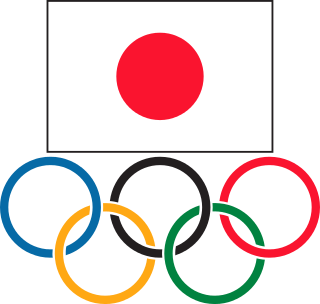
The Japan national under-23 football team is a national association football youth team of Japan and is controlled by the Japan Football Association. The team won the gold medal at the 2010 Asian Games and were champions in the 2016 AFC U-23 Championship. Since 1992, it was decided that teams targeting athletes under the age of 23 will participate in the Olympics. Therefore, the name changes to Japan national under-22 football team the year before the Olympics and Japan national under-21 football team two years prior. The exception to this is the 2020 Tokyo Olympics, which has been postponed for one year, so in 2021, the team will be called the Japan national under-24 football team.